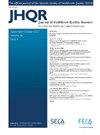髋部骨折的周末效应:资源管理的关键作用
IF 1
Q4 HEALTH CARE SCIENCES & SERVICES
引用次数: 0
摘要
“周末效应”是指在周末入院的患者要到下周初才能接受手术。目的是研究一周中某一天入院与手术时间之间的关系。材料与方法回顾性分析研究,纳入Miguel Servet大学医院于2023年3月1日至10月31日连续收治的65岁以上髋部骨折患者。收集入院日期、年龄、性别、骨折类型、抗凝或抗血小板治疗、手术时间等资料。对影响手术时间的因素进行多因素分析。结果共纳入348例患者。周一入院的患者平均手术时间为2.04天;周二,2.06;周三,2.14;周四,2.94;周五,3.24;周六,2.91;周日2点17分。多因素分析显示,周四入院(p <;0.001),星期五(p <;0.001),或周六(p <;0.001),与周一入院相比,手术时间增加了。服用维生素K拮抗剂(p = 0.006)和直接口服抗凝剂(p <;0.001)也延迟了手术。肱骨下骨折的治疗时间晚于基础颈骨折(p = 0.039)、粗隆下骨折(p = 0.018)和粗隆下骨折(p = 0.028)。结论在我中心,与周一相比,周四、周五或周六住院的患者手术时间明显增加。这可能会增加医院费用和与手术延误相关的潜在并发症。本文章由计算机程序翻译,如有差异,请以英文原文为准。
The weekend effect in hip fracture: The critical role of resource management
Introduction and objectives
The “weekend effect” refers to patients admitted at the end of the week who cannot undergo surgery until the beginning of the following week. The objective is to study the relationship between admission on a specific day of the week and the time to surgery.
Material and methods
A retrospective analytical study was conducted, including consecutive patients over 65 years old with a diagnosis of hip fracture admitted to Miguel Servet University Hospital from March 1 to October 31, 2023. Data such as admission day, age, sex, type of fracture, anticoagulant or antiplatelet therapy, and time to surgery were collected. A multivariate analysis was performed to investigate the factors influencing the time to surgery.
Results
A total of 348 patients were included. The average time to surgery for patients admitted on Monday was 2.04 days; Tuesday, 2.06; Wednesday, 2.14; Thursday, 2.94; Friday, 3.24; Saturday, 2.91; and Sunday, 2.17. The multivariate analysis showed that admission on Thursday (p < 0.001), Friday (p < 0.001), or Saturday (p < 0.001) increased the time to surgery compared to admission on Monday. Treatment with vitamin K antagonists (p = 0.006) and direct oral anticoagulants (p < 0.001) also delayed surgery. Subcapital fractures were treated later than basicervical (p = 0.039), pertrochanteric (p = 0.018), and subtrochanteric (p = 0.028) fractures.
Conclusion
In our center, admission on Thursday, Friday, or Saturday significantly increased the time to surgery compared to Monday. This may increase hospital costs and the potential complications related to surgical delay.
求助全文
通过发布文献求助,成功后即可免费获取论文全文。
去求助
来源期刊

Journal of Healthcare Quality Research
Medicine-Health Policy
CiteScore
1.70
自引率
8.30%
发文量
83
审稿时长
57 days
期刊介绍:
Revista de Calidad Asistencial (Quality Healthcare) (RCA) is the official Journal of the Spanish Society of Quality Healthcare (Sociedad Española de Calidad Asistencial) (SECA) and is a tool for the dissemination of knowledge and reflection for the quality management of health services in Primary Care, as well as in Hospitals. It publishes articles associated with any aspect of research in the field of public health and health administration, including health education, epidemiology, medical statistics, health information, health economics, quality management, and health policies. The Journal publishes 6 issues, exclusively in electronic format. The Journal publishes, in Spanish, Original works, Special and Review Articles, as well as other sections. Articles are subjected to a rigorous, double blind, review process (peer review)
 求助内容:
求助内容: 应助结果提醒方式:
应助结果提醒方式:


